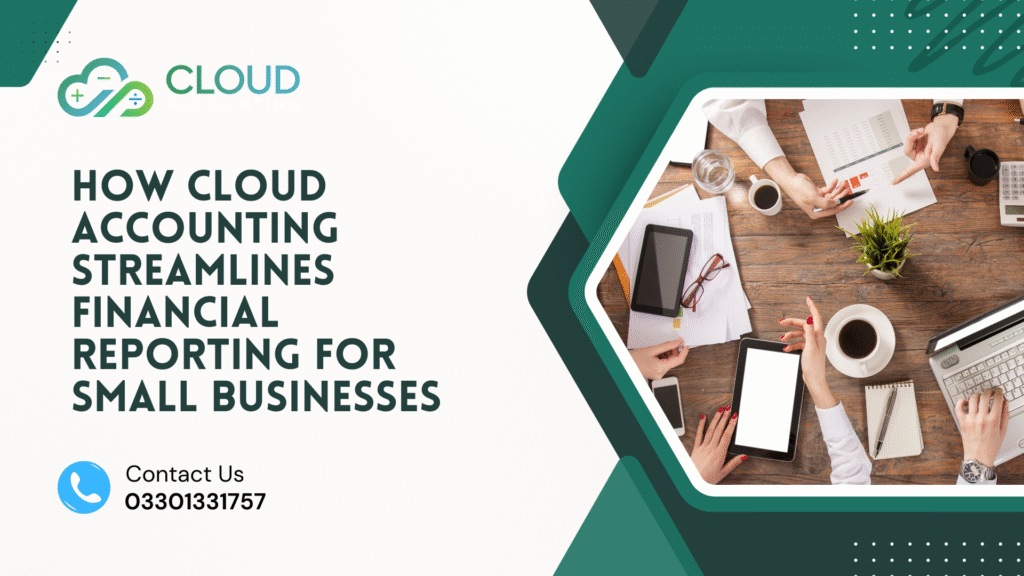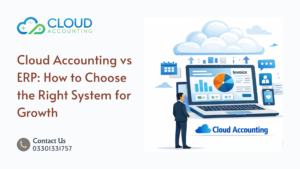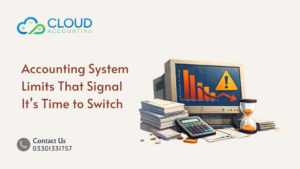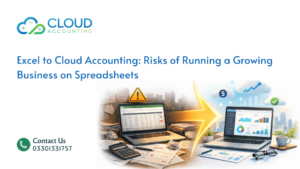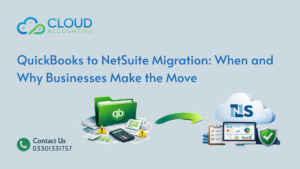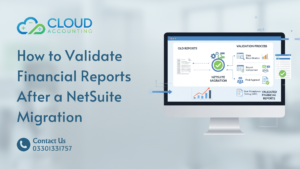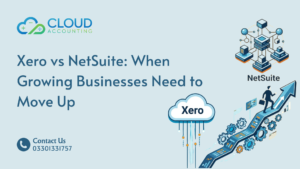Ever felt like you’re drowning in spreadsheets, trying to piece together your small business’s financial puzzle? If you’re a small business owner, you know that financial reporting can be a time-consuming headache, pulling you away from growing your business. But what if you could generate accurate, up-to-date reports with just a few clicks? That’s where cloud accounting for small business comes in, transforming complex data into clear insights. In 2025, with small businesses driving 44% of U.S. economic activity, real-time reports and automated financial reports are game-changers. Let’s explore how cloud accounting simplifies financial reporting, why real-time insights are critical, and how real businesses are thriving with these tools.
How Cloud Accounting Simplifies Financial Reporting
Imagine running your business with a crystal-clear view of your finances, without the chaos of manual calculations or outdated software. Cloud accounting for small business makes this a reality by streamlining financial reporting through intuitive, cloud-based platforms like Xero, QuickBooks Online, and Wave. Unlike traditional accounting, which often involves tedious data entry and delayed reports, cloud accounting automates and simplifies the process, saving you time and reducing errors.
Automation at Its Core
One of the biggest cloud accounting benefits is automation. Platforms like QuickBooks Online automatically sync with your bank accounts, categorizing transactions and generating automated financial reports in real-time. For example, as noted in Forbes’ 2025 review, QuickBooks can produce profit and loss statements, balance sheets, and cash flow reports with minimal input. Similarly, Xero’s integration with tools like A2X (as discussed in our A2X blog) streamlines e-commerce data, turning complex Amazon payouts into clean journal entries for accurate reporting.
User-Friendly Dashboards
Cloud accounting tools offer customizable dashboards that make financial reporting accessible, even for non-accountants. Instead of sifting through spreadsheets, you get visual summaries of key metrics like revenue, expenses, and outstanding invoices. Xero, for instance, provides a dashboard with graphs and charts, making it easy to spot trends at a glance. This simplicity ensures you can generate professional reports without needing an accounting degree, as highlighted in NerdWallet’s 2025 guide.
Seamless Integration
Cloud accounting for small business integrates with other tools like CRM systems, e-commerce platforms (e.g., Shopify), and payment gateways (e.g., Stripe). This connectivity ensures all your financial data flows into one system, eliminating data silos. For example, A2X integrates Amazon sales data with Xero, ensuring accurate financial reporting for e-commerce businesses. As a result, you get comprehensive reports that reflect your entire operation, from sales to taxes, without manual reconciliation.
By automating data collection, offering intuitive interfaces, and integrating with business tools, cloud accounting for small business makes financial reporting faster, easier, and more accurate, empowering you to focus on strategy and growth.
The Importance of Real-Time Financial Insights
Why wait weeks for a financial report when you can have answers now? Real-time reports are a cornerstone of cloud accounting benefits, providing instant visibility into your business’s financial health. In 2025, with e-commerce sales projected to hit $6.8 trillion globally, small businesses need agility to stay competitive. Here’s why real-time financial tracking is critical:
Informed Decision-Making
Real-time reports allow you to make data-driven decisions on the spot. For instance, if you’re considering a new marketing campaign, a quick glance at your cash flow report in QuickBooks can confirm whether you have the funds. According to TechRadar’s 2025 review, 65% of small businesses using cloud accounting cite real-time insights as a key factor in strategic planning. This immediacy helps you seize opportunities or address issues before they escalate.
Improved Cash Flow Management
Cash flow is the lifeblood of any small business, and real-time reports help you monitor it closely. Xero’s cash flow dashboard, for example, tracks incoming and outgoing funds, alerting you to potential shortfalls. This visibility allows you to adjust spending, chase overdue invoices, or negotiate better payment terms with suppliers, ensuring your business stays solvent.
Enhanced Compliance
Tax season can be daunting, but automated financial reports simplify compliance. Cloud platforms like Wave automatically categorize transactions and generate tax-ready reports, reducing the risk of errors. For e-commerce businesses, A2X’s integration with Xero (as noted in our A2X blog) ensures accurate tax reporting for Amazon sales, including VAT and sales tax across multiple countries. This real-time accuracy keeps you audit-ready and compliant with regulations like GDPR and CCPA.
Competitive Edge
Businesses with real-time financial tracking can pivot quickly in a fast-paced market. For example, if a report shows a product is underperforming, you can adjust pricing or inventory before losses mount. This agility gives you an edge over competitors stuck with outdated data, positioning your business for success.
By delivering instant, accurate insights, cloud accounting for small business transforms financial reporting into a strategic tool, helping you navigate challenges and capitalize on opportunities.
Examples of Businesses Benefiting from Cloud Accounting Tools
To bring the power of cloud accounting for small business to life, let’s look at three real-world examples of businesses leveraging Xero and QuickBooks for streamlined financial reporting. These stories illustrate how real-time reports and automated financial reports drive success.
1. The E-commerce Retailer: Scaling with Xero and A2X
Meet Sarah, who runs a $300,000 Amazon FBA business selling eco-friendly home goods across five EU countries. Before adopting Xero, Sarah struggled with manual reconciliation of Amazon’s complex payouts, which included sales, fees, and varying VAT rates. Generating financial reports was a monthly ordeal, taking days and often leading to errors.
After switching to Xero with A2X integration (as discussed in our A2X blog), Sarah transformed her financial reporting. A2X automates Amazon sales reconciliation, creating clean journal entries in Xero that match her bank deposits. Xero’s real-time dashboard shows her profit margins, VAT liabilities, and inventory costs at a glance. Now, Sarah generates tax-ready reports in minutes, saving 15 hours monthly and ensuring compliance with EU regulations. The result? She’s scaled her business to new markets, confident in her financial clarity.
2. The Freelance Graphic Designer: Simplifying with QuickBooks
Jake, a freelance graphic designer, used to track his income and expenses in spreadsheets, spending hours each month preparing invoices and tax reports. This manual process left little time for client work, and errors crept into his financials. After adopting QuickBooks Online, Jake leveraged its automated financial reports to streamline his workflow.
QuickBooks syncs with Jake’s bank account, categorizing client payments and expenses automatically. Its invoicing feature lets him create professional invoices and track payments in real-time, while the profit and loss report helps him monitor his earnings. According to Software Advice, freelancers using cloud accounting save an average of 8 hours per week. For Jake, this meant more time for creative projects and a 20% increase in client bookings, thanks to faster, more accurate financial reporting.
3. The Boutique Coffee Shop: Growing with Wave
Lila owns a boutique coffee shop with a small online store selling artisanal blends. Managing in-store and e-commerce sales was a challenge, with separate systems creating data silos. After adopting Wave, a free cloud accounting for small business platform, Lila unified her financials. Wave’s integration with her Shopify store and bank account automates transaction tracking, while its dashboard provides real-time reports on sales, expenses, and taxes.
For example, when Lila considered adding a new coffee blend, Wave’s cash flow report confirmed she had the funds. The platform’s tax reports also simplified her quarterly filings, saving her $500 annually on accounting fees. As noted in our previous blog, Wave’s affordability and scalability make it ideal for small businesses like Lila’s, which has since expanded to a second location.
Call-to-Action: Transform Your Financial Reporting Today
Ready to simplify your financial reporting in 2025? Cloud accounting for small business platforms like Xero, QuickBooks, and Wave offer real-time reports and automated financial reports to streamline your operations. Don’t let manual processes hold you back—explore these tools and see the difference for yourself. For expert setup and optimization, contact an eSeller Accountant to tailor your cloud accounting system, including integrations like A2X for e-commerce. Schedule a free consultation at Xero’s Advisor Directory or QuickBooks’ Find-a-ProAdvisor and take control of your financials now.
Conclusion
In 2025, cloud accounting for small business is a must-have for streamlined financial reporting. By automating data collection, offering real-time reports, and integrating with business tools, platforms like Xero and QuickBooks save time, reduce errors, and empower decision-making. From e-commerce sellers to freelancers and retailers, businesses are thriving with automated financial reports that provide clarity and compliance. Embrace cloud accounting benefits today and position your small business for success in a competitive market.

